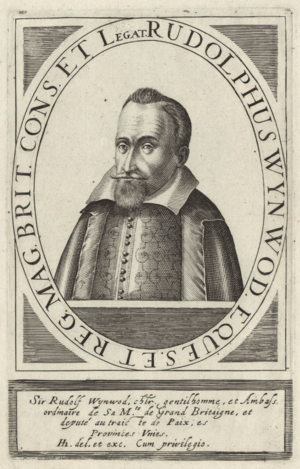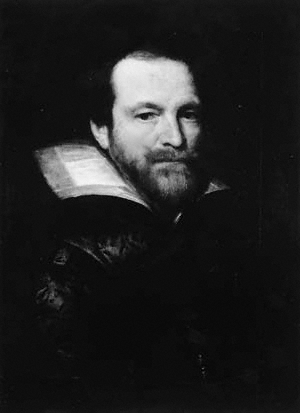Ralph Winwood facts for kids
Sir Ralph Winwood (born around 1563, died October 27, 1617) was an important English diplomat and statesman. He worked for the English government during the time of King James I, a period known as the Jacobean era. A diplomat helps a country talk and work with other countries, and a statesman is a skilled leader in government.
Contents
Early Life and Education
Ralph Winwood was born in a place called Aynhoe in Northamptonshire, England. His father was Richard Winwood. Ralph was known for being a very serious and religious person. He went to St John's College, Oxford in 1577 and then to Magdalen College, Oxford in 1582. To finish his education, he traveled to Italy and studied at the University of Padua in 1594.
A Career in Diplomacy and Government
Ralph Winwood chose a career as a diplomat. This meant he would represent England in other countries.
Working in France and the Netherlands
- In 1599, Winwood became a secretary to Sir Henry Neville, who was the English ambassador in France. An ambassador is the highest-ranking diplomat sent to another country.
- Two years later, in 1601, Winwood took over Sir Henry's job and stayed as ambassador in France until 1603.
- From 1603 to 1608, he worked as a clerk for the Privy Council. The Privy Council was a group of advisors to the King.
- In 1603, Winwood was sent to The Hague in the Dutch Republic (which is now the Netherlands). He worked there as an agent for England. He also became a member of the Dutch Council of State, which was a governing body.
- Winwood really disliked Spain. This feeling influenced his actions while he was in Holland. He wanted the war between Spain and the Dutch Republic to continue. He believed this war would be good for England, as long as England didn't have to pay for it.
- He was made a knight on June 28, 1607, which meant he was given the title "Sir."
Important Agreements and Conflicts
- In June 1608, Sir Ralph Winwood signed an agreement between England and the Dutch Republic.
- Soon after, he became the first official English ambassador to the Dutch Republic.
- While in Holland, a problem arose over who would rule the areas of Jülich and Cleves in Germany. This problem almost started a big war in Europe. Winwood helped King James I of England talk with the Protestant leaders in Germany about this issue.
- He also got some hunting dogs (greyhounds) for Anne of Denmark, who was King James I's wife, from a Dutch governor.
- From 1609 to 1614, he held the job of Master of Requests. This role involved dealing with petitions and requests made to the King.
Return to England and Secretary of State
- After returning to England, Sir Ralph became a Secretary of State in 1614. This was a very important job, like a modern-day government minister. He also became a member of the Privy Council.
- He also served as a Member of Parliament (MP) for Buckingham. An MP is a representative elected to the House of Commons, which is part of the English Parliament.
- As Secretary of State, Winwood defended the King's right to collect certain taxes.
- He was involved in looking into the death of Sir Thomas Overbury.
- He also helped Sir Walter Raleigh get out of prison in 1616. Winwood encouraged Raleigh to attack Spanish ships and settlements in South America.
- Spanish diplomats in England complained to King James I about Winwood's part in this plan.
- Sir Ralph Winwood died in London on October 28, 1617, during this time of tension with Spain.
Family Life
Ralph Winwood married Elizabeth Ball. She was the daughter of Nicholas Ball. They had five sons, but two of them died before him. They also had four daughters. One of his daughters, Anne Winwood, married Edward Montagu, 2nd Baron Montagu of Boughton. Their son was Ralph Montagu, 1st Duke of Montagu, who became a very important person later on.
Sources
| Diplomatic posts | ||
|---|---|---|
| Preceded by George Gilpin as English Councillor on the Dutch Council of State |
English agent then ambassador to the United Provinces 1603–1613 With: Sir Richard Spencer as Joint Commissioner 1607–1609 |
Succeeded by Sir Henry Wotton |
| Government offices | ||
| Preceded by Robert Carr, Lord Rochester John Herbert |
Secretary of State 1614–1617 With: John Herbert 1614–1616 Sir Thomas Lake 1616–1617 |
Succeeded by Sir Robert Naunton Sir Thomas Lake |
 | William M. Jackson |
 | Juan E. Gilbert |
 | Neil deGrasse Tyson |



